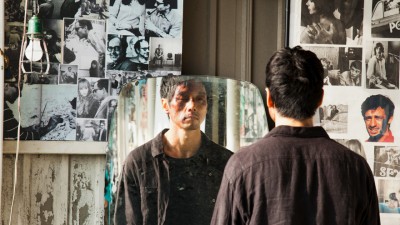| Reviews & Columns |
|
Reviews DVD TV on DVD Blu-ray 4K UHD International DVDs In Theaters Reviews by Studio Video Games Features Collector Series DVDs Easter Egg Database Interviews DVD Talk Radio Feature Articles Columns Anime Talk DVD Savant Horror DVDs The M.O.D. Squad Art House HD Talk Silent DVD
|
DVD Talk Forum |
|
|
| Resources |
|
DVD Price Search Customer Service #'s RCE Info Links |
|
Columns
|
|
|
Cut

Reviewed at the 2012 Tribeca Film Festival
Shuji (Hidetoshi Nishijima), the central character in Amir Naderi's Cut, is a figure not unknown to anyone likely to see the film in America. He lives alone, in an apartment wallpapered with lobby cards and movie stills. He hosts screenings on his roof, running prints of Keaton and Ford films. He reverentially visits the tombs of Kurosawa, Ozu, Mizoguchi. And he walks the streets with a bullhorn, shouting pronouncements of the dire state of cinema. "The artistic side of cinema is dying! Most of today's movies are simply made to entertain!" he seethes. "They have no right to extinguish pure cinema!" He has attempted to contribute to the art himself, but his films thus far have only managed to lose the money provided to Shuji by his brother, a yakuza enforcer. Then Shuji finds out that those debts were never repaid--and his brother has been killed. He has inherited the balance of the debt, over 12 million yen. He has two weeks to make it right. The threatening man who gives him that information doesn't say what will happen at the end of that two weeks. He doesn't have to; there's a head-sized box on his desk.
There's something rather delicious about this set-up, in which the movie-crazy aesthete finds himself in a remarkably cinematic situation, and--one would think--must find a definitively real-world solution. Instead, Naderi's uses it as a realization of the all-too-commonly invoked notion of suffering for one's art--and drawing strength from it. This is not metaphorical suffering and strength; the scheme that Shuji stumbles into, somewhat accidentally, is to offer himself up as a paid punching bag for the various gangsters and gamblers that work for and with the organization. He gets paid by the punch. At first, he lets them punch anywhere, but it quickly becomes clear that he won't last long doing that. So he charges five thousand yen per body blow, and takes the abuse. And takes it, and takes more.
As he subjects himself to the punishment, he reminds himself of what it is worth, what he is paying off (the films he made) and what he is preserving (the life ahead of him--one in which, presumably, he will watch and make more movies). At first, he mutters trivia to himself. Later, when the going gets tougher, he hypes himself up and keeps himself going with a contemptuous cry of "shit movies!" He visualizes himself as the art, of the purity; he takes the punches of crass commerce.
If it sounds a little silly, blame the messenger--there's all sorts of ways to read what's happening here, and it's the kind of film that allows interpretation without insisting on it. If it sounds brutal and ugly, well, it is (a little, anyway), but it's not a cheap or exploitative picture; Naderi is a classicist, using deliberate pacing and unconventional rhythms early on to soften viewers up and acclimate them to his speed. His compositions are dynamic but clean, carefully arranged within his mostly locked frames (camera movements are deliberate and purposeful).
Some of the stylistic touches don't quite play, like the switches to black and white during those tomb visits, a ponderous shot of a punching bag during the first beating session, or the puzzling cutaways to aerial city shots during a particularly desperate fight scene. But for the most part, the picture is technically masterful, and shows a remarkable visual efficiency.
It probably gives little away to hint that the scheme goes down to the wire, with a heavily battered Shuji finally determining that one last day of sheer hell, one final pummeling that will risk his life, is a small price to pay. "I want to live! I want to make films!" he insists--finding, in art, the very will to live. And thus is constructed Cut's most electrifying sequence, in which he wagers that the can take 100 punches and survive. To push himself through, he ticks off his 100 favorite films (a task any movie lover relishes), which are seen as text on screen as the pounding progresses. And then Naderi does something really interesting: he takes the sound effects out, and lays in that bullhorn audio, those announcements of what he's (literally) fighting for, which compliment the examples of it in the titles and names on screen. It all comes together--thought it seems at first a gimmick, he's actually creating a manifesto film, something borderline Godardian. And he's creating an additional cause for rooting interest: thought the list is supposed to be "in no particular order," he's clearly ranking at least the top slots, and we're really want to see what his top ten is--even more, perhaps, then we want to see him survive. Cold blooded? No, just cinematically curious. Something tells me Shuji would understand.
Jason lives in New York. He holds an MA in Cultural Reporting and Criticism from NYU.
|
| Popular Reviews |
| Sponsored Links |
|
|
| Sponsored Links |
|
|
| Release List | Reviews | Shop | Newsletter | Forum | DVD Giveaways | Blu-Ray | Advertise |
|
Copyright 2024 DVDTalk.com All Rights Reserved. Legal Info, Privacy Policy, Terms of Use,
Manage Preferences,
Your Privacy Choices | |||||||











